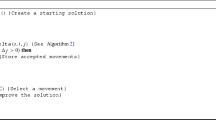Abstract
This paper presents the use of a combined ant colony system (ACS) and nearest neighbour heuristic (NNH) algorithm in DNA fragment assembly. The assembly process can be treated as combinatorial optimisation where the aim is to find the right order of each fragment in the ordering sequence that leads to the formation of a consensus sequence that truly reflects the original DNA strands. The assembly procedure proposed is composed of two stages: fragment assembly and contiguous sequence (contig) assembly. In the fragment assembly stage, a possible alignment between fragments is determined where the fragment ordering sequence is created using the ACS algorithm. The resulting contigs are then assembled together using the NNH rule. The results indicate that in overall the performance of the combined ACS/NNH technique is superior to that of a standard sequence assembly program (CAP3), which is widely used by many genomic institutions.
Preview
Unable to display preview. Download preview PDF.
Similar content being viewed by others
References
Applewhite, A.: Mining the genome. IEEE Spectrum 39(4), 69–71 (2002)
Pop, M., Salzberg, S.L., Shumway, M.: Genome sequence assembly: Algorithms and issues. Computer 35(7), 47–54 (2002)
Huang, X., Madan, A.: CAP3: A DNA sequence assembly program. Genome Research 9(9), 868–877 (1999)
Green, P.: Phrap documentation. Phred, Phrap, and Consed (2004), http://www.phrap.org
Ferreira, C.E., de Souza, C.C., Wakabayashi, Y.: Rearrangement of DNA fragments: A branch-and-cut algorithm. Discrete Applied Mathematics 116(1-2), 161–177 (2002)
Batzoglou, S., Jaffe, D., Stanley, K., Butler, J., Gnerre, S., Mauceli, E., Berger, B., Mesirov, J.P., Lander, E.S.: ARACHNE: A whole-genome shotgun assembler. Genome Research 12(1), 177–189 (2002)
Kececioglu, J.D., Myers, E.W.: Combinatorial algorithms for DNA sequence assembly. Algorithmica 13(1-2), 7–51 (1995)
Pevzner, P.A., Tang, H., Waterman, M.S.: An Eulerian path approach to DNA fragment assembly. Proceedings of the National Academy of Sciences of the United States of America 98(17), 9748–9753 (2001)
Burks, C., Engle, M., Forrest, S., Parsons, R., Soderlund, C., Stolorz, P.: Stochastic optimization tools for genomic sequence assembly. In: Adams, M.D., Fields, C., Venter, J.C. (eds.) Automated DNA Sequencing and Analysis, pp. 249–259. Academic Press, London (1994)
Parsons, R.J., Forrest, S., Burks, C.: Genetic algorithms, operators, and DNA fragment assembly. Machine Learning 21(1-2), 11–33 (1995)
Parsons, R.J., Johnson, M.E.: A case study in experimental design applied to genetic algorithms with applications to DNA sequence assembly. American Journal of Mathematical and Management Sciences 17(3-4), 369–396 (1997)
Kim, K., Mohan, C.K.: Parallel hierarchical adaptive genetic algorithm for fragment assembly. In: Proceedings of the 2003 Congress on Evolutionary Computation, Canberra, Australia, pp. 600–607 (2003)
Angeleri, E., Apolloni, B., de Falco, D., Grandi, L.: DNA fragment assembly using neural prediction techniques. International Journal of Neural Systems 9(6), 523–544 (1999)
Dorigo, M., Gambardella, L.M.: Ant colony system: A cooperative learning approach to the traveling salesman problem. IEEE Transactions on Evolutionary Computation 1(1), 53–66 (1997)
Smith, T.F., Waterman, M.S.: Identification of common molecular subsequences. Journal of Molecular Biology 147(1), 195–197 (1981)
Benson, D.A., Karsch-Mizrachi, I., Lipman, D.J., Ostell, J., Wheeler, D.L.: GenBank. Nucleic Acids Research 33, D34–D38 (2005)
Author information
Authors and Affiliations
Editor information
Editors and Affiliations
Rights and permissions
Copyright information
© 2006 Springer-Verlag Berlin Heidelberg
About this paper
Cite this paper
Wetcharaporn, W., Chaiyaratana, N., Tongsima, S. (2006). DNA Fragment Assembly by Ant Colony and Nearest Neighbour Heuristics. In: Rutkowski, L., Tadeusiewicz, R., Zadeh, L.A., Żurada, J.M. (eds) Artificial Intelligence and Soft Computing – ICAISC 2006. ICAISC 2006. Lecture Notes in Computer Science(), vol 4029. Springer, Berlin, Heidelberg. https://doi.org/10.1007/11785231_106
Download citation
DOI: https://doi.org/10.1007/11785231_106
Publisher Name: Springer, Berlin, Heidelberg
Print ISBN: 978-3-540-35748-3
Online ISBN: 978-3-540-35750-6
eBook Packages: Computer ScienceComputer Science (R0)




